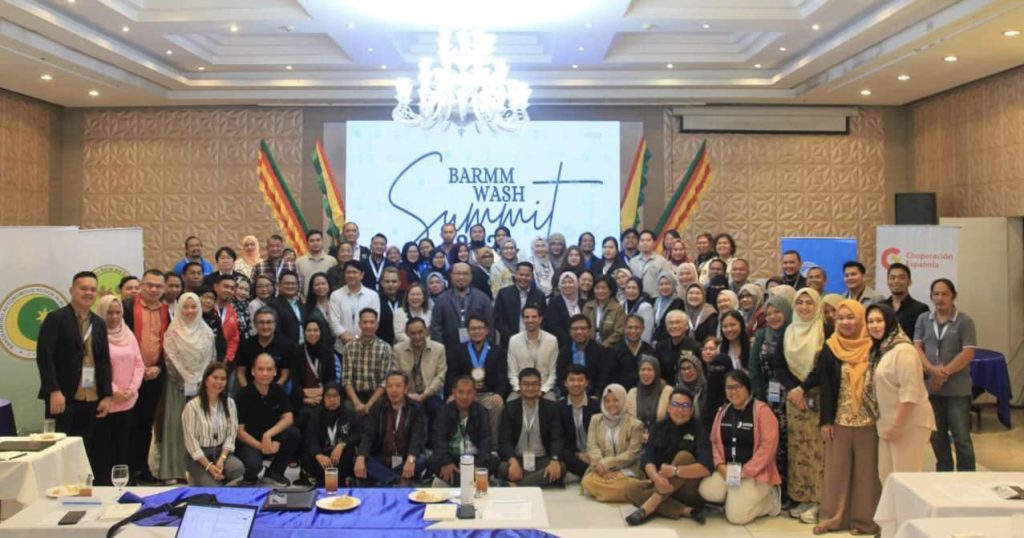
DAVAO CITY – The Bangsamoro Planning and Development Authority (BPDA) participated in the 1st BARMM WASH Summit 2024, held from June 19-21 at the Royal Mandaya Hotel, this city. The BPDA provided technical assistance as a key member of the summit’s Steering Committee and served as a panel discussant during the open forum.
Palawan Mamaon, Chief of the Social Planning Division (SPD) of the BPDA, highlighted the importance of supporting the Water, Sanitation, and Hygiene (WASH) program in the Bangsamoro Autonomous Region in Muslim Mindanao (BARMM), emphasizing the need for commitment from both regional and local governments to support the program. Mamaon also underscored the significance of sanitation and hygiene in daily living, from both practical and Islamic perspectives.
“As Muslims and as Believers, even among non-muslims, it is imperative to take care of everything that is beneficial to our health: from the water that we drink, to the food that we eat, and the environment that we live; we have to protect and take care of it all that is why supporting this program is necessary,” said BARMM Health Minister Kadil Sinolinding, Jr.
WASH program is a comprehensive initiative aimed at improving access to clean water, adequate sanitation, and proper hygiene practices across the region. The program is designed to address critical issues that affect public health and the overall well-being of the Bangsamoro people.
The Bangsamoro government, through the Bangsamoro Sub-Committee on WASH (BSCW) and in collaboration with development partners such as AECID and UNICEF, spearheaded this inaugural summit with the theme, “Beyond Barriers: WASH Now for a Better Tomorrow.” The summit was made possible by the insights and inputs gathered from provincial-level activities conducted between 2023 and 2024, including WASH Bottleneck Analysis, Program Implementation Review, and a series of BSCW meetings.
Among the attendees were BSCW members, representatives from local government units (LGUs) including its administrators, planning and development officers, local government operations officers, school WASH in Schools (WinS) officers, IPHO/PHOs, WASH officers from the provinces of Basilan, Sulu, Tawi-Tawi, Maguindanao del Sur, Maguindanao del Norte, Lanao del Sur, Special Geographic Area, as well as from the cities of Cotabato, Marawi, and Lamitan, alongside other stakeholders participating in the three-day activity.
The summit highlighted the achievements and best practices among LGUs that have made significant milestones in achieving Zero Open Defecation (ZOD), following the guidelines from the Philippine Approach to Sustainable Sanitation (PHATSS) for better planning, programming, and implementation of WASH program in the region. Notably, the municipality of Wao in Lanao del Sur has attained G1 status, while the municipality of Upi in Maguindanao del Norte has reached G2 level. Additionally, the provincial government of Iloilo was invited to share its journey in becoming the first province in the Philippines to achieve province-wide ZOD status.
The summit also served as a platform to address the pressing concerns faced by communities in BARMM, where access to adequate WASH services remains a persistent challenge. To collectively highlight the current WASH situation in the region, the Ministry of Health (MOH) presented on WASH in Communities and Institutions, the Ministry of Social Services and Development (MSSD) discussed WASH in Early Childhood Care and Development (ECCD), Basic Education Bureau Director Johnny Balawag of the Ministry of Basic, Higher, and Technical Education (MBHTE) presented WASH in Schools, and the Ministry of Public Works (MPW) and other regional line agencies shared their WASH initiatives during the event.
Moreover, the summit provided insights into the WASH situation from global, national, and BARMM perspectives. It discussed existing initiatives, innovations, and opportunities from the government and partners for this program. Further, WASH policies and mandates presented by the Department of Health (DOH) were explored, highlighting how they can be contextualized and adapted to the specific needs of BARMM.



